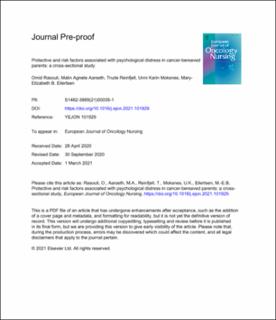| dc.contributor.author | Rasouli, Omid | |
| dc.contributor.author | Aarseth Bø, Malin | |
| dc.contributor.author | Reinfjell, Trude | |
| dc.contributor.author | Moksnes, Unni Karin | |
| dc.contributor.author | Eilertsen, Mary-Elizabeth B | |
| dc.date.accessioned | 2021-03-29T08:36:09Z | |
| dc.date.available | 2021-03-29T08:36:09Z | |
| dc.date.created | 2021-03-06T23:22:12Z | |
| dc.date.issued | 2021 | |
| dc.identifier.citation | European Journal of Oncology Nursing. 2021, 51 . | en_US |
| dc.identifier.issn | 1462-3889 | |
| dc.identifier.uri | https://hdl.handle.net/11250/2735866 | |
| dc.description.abstract | Purpose: Research shows that knowledge about mental health status, both protective and risk factors, is limited in cancer-bereaved parents. The study aimed to investigate (1) the extent of psychological distress in bereaved parents 2-8 years after the loss of a child to cancer compared to non-bereaved parents, and (2) psychological distress in association with resilience, the extent of having coped with the grief, time since the loss, and past psychological distress in cancer-bereaved parents. Design: Retrospective, cross-sectional study. Methods: A Norwegian nationwide study-specific questionnaire was completed by 162 parents who lost a child to cancer, and 77 matched non-bereaved parents. We used the Cohort Norway-Mental Health Index and Resilience Scale for Adults to measure psychological distress and resilience, respectively. The extent of having coped with grief was also measured. Results: Bereaved parents experienced significantly more symptoms of psychological distress, albeit not clinical psychological distress, compared to non-bereaved parents. The bereaved parents who have coped with their grief or had higher resilience reported lower psychological distress. Positive “Perception of self” and well “Planned future” were the strongest predictors of psychological distress in both bereaved fathers and mothers. Conclusion: Both fathers and mothers experience more psychological distress symptoms 2-8 years after losing a child to cancer than non-bereaved parents. The findings also highlight the need for long-term support to bereaved parents in order to help to improve their resilience and to better cope with their grief. Keywords: Bereaved Families, Childhood Cancer, Mental Health Problems, Grief, Resilience, Bereavement | en_US |
| dc.language.iso | eng | en_US |
| dc.publisher | Elsevier | en_US |
| dc.rights | Attribution-NonCommercial-NoDerivatives 4.0 Internasjonal | * |
| dc.rights.uri | http://creativecommons.org/licenses/by-nc-nd/4.0/deed.no | * |
| dc.title | Protective and risk factors associated with psychological distress in cancer-bereaved parents: a cross-sectional study | en_US |
| dc.type | Peer reviewed | en_US |
| dc.type | Journal article | en_US |
| dc.description.version | acceptedVersion | en_US |
| dc.source.pagenumber | 7 | en_US |
| dc.source.volume | 51 | en_US |
| dc.source.journal | European Journal of Oncology Nursing | en_US |
| dc.identifier.doi | 10.1016/j.ejon.2021.101929 | |
| dc.identifier.cristin | 1896131 | |
| dc.description.localcode | "© 2020. This is the authors’ accepted and refereed manuscript to the article. Locked until 1.4.2022 due to copyright restrictions. This manuscript version is made available under the CC-BY-NC-ND 4.0 license http://creativecommons.org/licenses/by-nc-nd/4.0/ " | en_US |
| cristin.ispublished | true | |
| cristin.fulltext | preprint | |
| cristin.qualitycode | 1 | |

